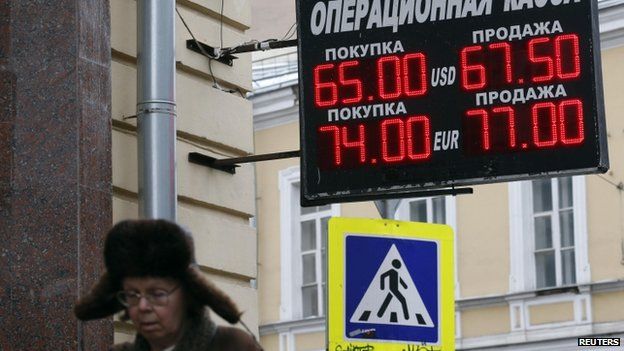Russian President Putin cuts staff's salaries by 10%
- Published

Russian President Vladimir Putin has announced that the salaries of his staff are to be cut by 10%.
The move follows a proposal to slash 10% from MPs' salaries and ministry spending, and to use billions of dollars from an emergency fund.
Russia's economy has been badly hit by low oil prices and Western sanctions over Moscow's role in Ukraine's crisis.
It was not clear when the cuts would come into effect, and whether they would cover Mr Putin's own pay.
The move is presumably meant to set an example, as Russia enters difficult economic times, the BBC's Sarah Rainsford in Moscow reports.
It is all part of a broader austerity drive, she says, as Russia's income has shrunk along with the falling oil price. Western sanctions over the Ukraine conflict are also biting.
Popularity unshaken
In a brief statement on Friday, the Kremlin said permanent members of Russia's security council discussed "a number of social and economic issues".
It added that Mr Putin informed the council about his decision to lower salaries in the presidential administration "outside the context of the meeting's agenda".
Earlier this week Sergei Naryshkin, the speaker of the State Duma (lower chamber of parliament), said lawmakers should take a 10% pay cut to help the country through a financial crisis.
Mr Naryshkin appealed to their patriotism to back his proposal.
Russian Finance Minister Anton Siluanov has also pledged to reduce the spending by the federal ministries and government agencies by 10% in 2015.
In a separate development, Mr Siluanov's first deputy said on Friday the government would ask parliament to allow the spending of up to 3.2tn roubles ($52bn; £34bn) from the Reserve Fund, according to Reuters news agency.
This would include 500bn roubles already envisaged in the budget for 2015.
The Russian government is already revising the budget, which was based on oil prices at $100 a barrel. Prices are now hovering at about $60.
The drop in oil income - along with the impact of sanctions following the crisis in Ukraine - has left the country heading for recession, analysts say. Forecasts suggest Russia's economy will contract this year by up to 4%.
This week supermarkets announced a price freeze on essential items to help struggling customers. Pharmacies are set to follow.
It is all a long way from the boom times that have characterised much of Mr Putin's presidency, our correspondent says, but so far it seems his personal rating is unshaken. A key opinion poll just released showed his popularity actually increased in February to 86%.
- Published24 February 2015
- Published24 February 2015
- Published24 February 2015
- Published14 November 2014
- Published21 July 2014